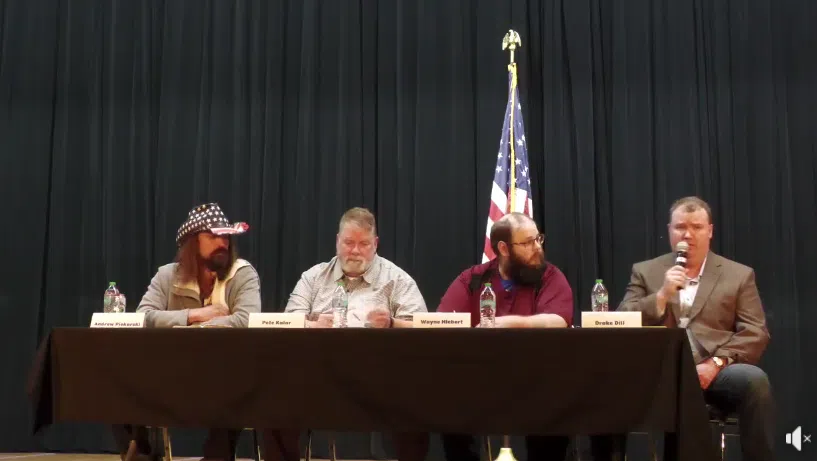The mayoral candidates in International Falls have put forward their platforms for election in November.
Four took part in a debate sponsored by the International Falls Chamber of Commerce and broadcast by KCC-TV.
One of the issues for the city is the cost of maintaining its ambulance service.
Pete Kalar, a council member currently, says economic development and housing are top priorities for the city.
“Everybody is going to tell you that we need to create more jobs, which I agree, and economic development. But all those things, one of those things that come together with that is housing,” says Kalar
Wayne Hebert also sees the need for more housing as an issue to resolve.
“If we have more housing, that also means more jobs, more people into the community, which will also help other schools in the area,” says Hebert.
He also says the city also needs to improve on its infrastructure such as road and sewer lines.
Andrew Piekarski names industry and infrastructure as his priorities.
“I believe that we need to bring more industry into this town. We are dwindling as a community and we need to provide new ways to empower people in order to bring business into this town,” says Piekarski.
Drake Dill bringing accountability to council is a main priority for him/
“Making sure that we’re spending the money properly and being as efficient as we can to fund those services,” says Dill.
The candidates fielded questions around airport funding, deer hunting and ambulance service.
Kalar sees running it differently as helping to save money.
“We have changed our model over the years so down to, we have teams of one paramedic and one EMT,” says Kalar.
“I’m working together to cut down on the costs and part of the time there on call if it requires. So there’s a 24-hour service going on. And then it’s a continued process of looking where we can cut back and trim back.”
Hebert supports providing the service with more funding.
“I understand that the cost-cutting is something that does help out the taxpayer, but at the same time, I’m honestly believing that we’d still need an ambulance system as well as a thoroughly trained team,” says Hebert.
Piekarski supports finding savings in other departments to help fund the service.
“I believe that many of the taxes that people are paying are going towards things that are not necessarily imperative to this community,” says Piekarski.
“I believe there’s many ways that we can find things in the budget that we can cut, that we can actually take those taxes and put them towards things that are absolute necessities, like, obviously, the ambulance.”
Dill also favours doing what can be done to maintain the service.
“I’m a bit concerned that we’re being too hard as a community on the paramedics and the support staff to run the ambulance,” says Dill.
“We’re going to have to work to find those funds in our budget unless there’s relief from the state.”
The election takes place on November 5th.




